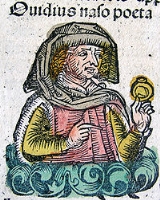
-speaking world, was a Roman
poet who is best known as the author of the three major collections of erotic poetry: Heroides
, Amores, and Ars Amatoria
. He is also well known for the Metamorphoses, a mythological hexameter
poem; the Fasti
, about the Roman calendar; and the Tristia
and Epistulae ex Ponto
, two collections of poems written in exile on the Black Sea.
Sic ego nec sine te nec tecum vivere possum.![]()
Exitus acta probat.![]()
Resist beginnings; the prescription comes too late when the disease has gained strength by long delays.![]()
Qui finem quaeris amoris/Cedit amor rebus; res age, tutus eris.![]()
Poetry comes fine-spun from a mind at peace.![]()
So long as you are secure you will count many friends; if your life becomes clouded you will be alone.![]()
Cura quid expediat prius est quam quid sit honestum![]()
Note too that a faithful study of the liberal arts humanizes character and permits it not to be cruel.![]()
The mind, conscious of rectitude, laughed to scorn the falsehood of report.![]()
They come to see; they come that they themselves may be seen.![]()

